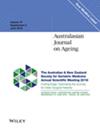Understanding the consumer, carer and stakeholder experiences of residential respite care
Abstract
Objectives
Residential aged care respite clients are vulnerable and prone to poor health-care outcomes. Improvements in the quality of care for this cohort are urgently needed. However, before proposing changes in care models, a nuanced understanding of relevant issues affecting respite care consumers and professionals is required. We aimed to explore perspectives of consumers, carers, health-care workers and aged care workers involved in residential respite care (RRC).
Methods
We used purposive sampling to recruit respite consumers, their family members, residential aged care staff and health-care workers across metropolitan Melbourne for semi-structured telephone interviews and electronic surveys regarding RRC. Thematic analysis of interviews and surveys was performed.
Results
Twenty-three semi-structured in-depth interviews (five family members, four residential aged care staff, five general practitioners, two nurse practitioners, seven hospital staff) and 12 electronic surveys (five family members, three general practitioners, four hospital staff) were completed. Five key themes were identified: (1) reasons for using respite care vary; (2) expectations and understanding of respite care vary; (3) structural and funding factors influence the experience and quality of care; (4) care professionals often lack timely access to accurate health-care information; and (5) medical management and health-care needs of respite residents are complex.
Conclusions
These findings from multiple stakeholders highlight several issues regarding the benefits of and problems with RRC, and the interfaces between the aged care and health-care sectors. Understanding these issues is pivotal in informing targeted and systemic interventions to improve RRC.

 求助内容:
求助内容: 应助结果提醒方式:
应助结果提醒方式:


